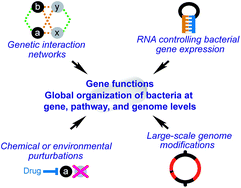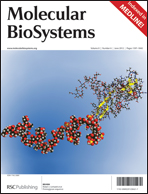Bacteria are diverse and abundant, playing key roles in human health and disease, the environment, and biotechnology. Despite progress in genome sequencing and bioengineering, much remains unknown about the functional organization of prokaryotes. For instance, roughly a third of the protein-coding genes of the best-studied model bacterium, Escherichia coli, currently lack experimental annotations. Systems-level experimental approaches for investigating the functional associations of bacterial genes and genetic structures are essential for defining the fundamental molecular biology of microbes, preventing the spread of antibacterial resistance in the clinic, and driving the development of future biotechnological applications. This review highlights recently introduced large-scale genetic manipulation and screening procedures for the systematic exploration of bacterial gene functions, molecular relationships, and the global organization of bacteria at the gene, pathway, and genome levels.

You have access to this article
 Please wait while we load your content...
Something went wrong. Try again?
Please wait while we load your content...
Something went wrong. Try again?


 Please wait while we load your content...
Please wait while we load your content...